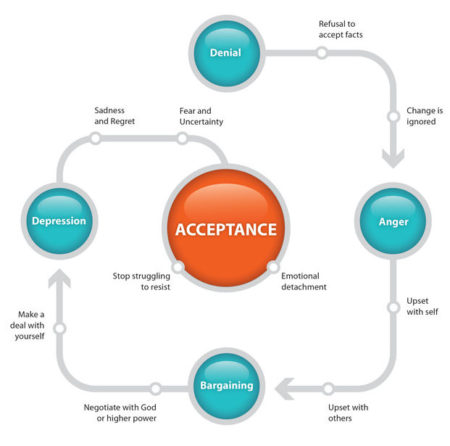GRIEF AND BEREAVEMENT COUNSELING

Tiffany is devastated that her father passed away, and to one degree or another, she’s also surprised at this reality. It isn’t that she didn’t think she’d be sad — she knew that when he was gone she would feel empty. But she has been unprepared for the additional and complicating layer of emotional pain at how much was left unsaid between the two of them. Tiffany’s father had never been able to accept the core of who she was. She “knows” in her head that he loved her, but she can’t escape the fact that their unreconciled differences seem to cast doubt. Tiffany cannot be consoled and has had to take time off work because she cannot concentrate. Just yesterday she started crying out of the blue in the checkout line at the grocery store. All she can think about is how much she wanted to say but never had a chance. Tiffany is worried that she will never be able to escape this overwhelming grief.
Dan has felt numb since his wife died. They had been married for 35 years and had three wonderful children. At the funeral, Dan appeared rather “emotionless,” if the commentary from his best friend (who is trying to help) is any indication. All his children were crying, but he just stood and stared into space. He can’t eat or sleep, and keeps talking about his wife. His children are trying to help too, but nothing seems to work, and it is making their own grief process a lot more complicated. Dan mentioned to that there is no purpose to life without his wife.
Eric and Vanessa were together for 20 years, but for the last several, Vanessa had become increasingly distant. Eric barely noticed at first, and assumed it was related to her recent promotion to VP at her job, a large marketing firm downtown. But after a fatal text message mishap, he discovered Vanessa had been cheating on him with her assistant for at least 18 months. Now, some 14-months later, he is struggling to move on. A friend who lost her partner the year before suggested that he seemed to be experiencing a grief process, which seemed to make sense to him. Even though he hadn’t experienced the physical death of his partner, their relationship very much died.
Grief and Bereavement
Individuals may assume the grief and bereavement are the same thing, and in fact, they are similar. One way to explain the relationship between these terms and the concepts they surround is to say that grief could be seen as an process-oriented emotional reaction to death, and bereavement is our actual choice/action of working through an individuals’ death. When someone we know dies, we enter a period of bereavement that contains a multitude of emotions. This period of bereavement, and the emotions that go along with it, is different for everyone.
Used in a sentence, the difference might be highlighted like this:
“After my uncle died, my bereavement contained a lot of things that are typically experienced in the process of grief, but I also experienced some things that I’ve never seen anyone actually write about.”
As a subset of grief, it may help to understand that an individual can enter acute grief, which is a short period of intense emotions after the death of a loved one. Acute grief lasts for less than six months, and does not interfere with an individuals’ daily functioning. On the other hand, complicated grief lasts longer than six months and impairs an individuals’ daily functioning. Grief often becomes complicated when some additional factors impede a more straight-forward process — things like unresolved differences, unexpected or traumatic death, pre-existing mental health issues in the person grieving, etc.

While it is important to say that everyone’s grief processes are going to vary, it is equally important to acknowledge the ways that our grief processes may have commonalities. Grief is usually associated with sadness and numbness, but can also produce feelings of relief, happiness, or anger. The precise emotional content is of course impacted greatly by one’s relationship to the deceased. During certain periods of the bereavement process, emotions may seem uncomfortable and/or even unsafe. This discomfort can last for short or extended periods of time, and depends on the individuals’ grief stage.
How Long Does Grief Last?
There is no “normal” duration for grief per se — it may last anywhere from a number of days or weeks to a number of months or years. Again, the contextual factors informing a person’s grief process highly inform how long grief will last. For example, a relatively healthy and functional person (1) who had a relatively healthy relationship (2) with a parent who died somewhat expectedly of normal causes at an old age (3) may find that their grief is real, painful, and palpable, but mostly acute (lasting 6 months or less). But if we were to change 1, 2, or 3, grief becomes more complicated. For example, a person who has existing depression problems (1A) who had a relatively healthy relationship (2) with a parent who died somewhat expectedly of normal causes at an old age (3) may find that their grief process is impeded by how frequently they lapse into pre-existing feelings of worthlessness and hopelessness, thus preventing them from feeling the simple pain of loss itself. This might result in a prolonging of the initial grief period.
Also, it’s worth noting that even healthy, straight-forward grief processes plain and simply hurt like hell. There really is no way around that. Further, even when we’ve healed, the grief process may irrevocably change us and leave us feeling that things, and even we ourselves, are no longer the same. And indeed, when we lose an important relationship or person (etc.), we aren’t the same any more. Learning to find the new you, impacted by grief but not defeated, is the goal.
The Stages of Grief
Elisabeth Kubler-Ross determined that our grief processes have a number of things in common, which she developed the five stages of grief. To explain them briefly:
- Denial: The first stage in the grief process centers around difficulty integrating the passing of a loved one or relationship (job, etc.). People grieving may even find themselves saying aloud or repeating in their heads, from time to time, “I can’t believe this is happening.” This doesn’t literally mean you can’t believe it, but that the shell shock you feel is so complete that it is almost as if it is literally true.
- Anger: Conventional psychological wisdom suggests that anger is not a primary emotion, but a secondary emotion. In other words, we feel a primary emotion first (shock, rage, sadness, etc.), then think about our situation and decide that it is unjust or unwarranted or simply unwanted — then we’re mad. In the anger stage, an individual grieving begins to realize that in fact, their loved family member, friend, parent, relationship, job, etc., is not coming back. The sense of loss feels unjust or unwelcome (etc.) and is transferred to anger. There is typically a cognitive process associated with this that the griever may or may not be aware of, which may sound like this: “Oh my gosh. This did happen — my friend is gone! But this should not be — it is unjust!!!” In other words, some form of protest is often the driving force behind the anger within grief. It may simply be protest at the seeming futility and quickness of life, at lack of reconciliation or healing, or something else. Responsively, close friends, family members, doctors, or objects may become the targets of a grieving person’s anger. In some cases, the anger is directed inwards, and the person may implicitly or explicitly punish themselves through negative thoughts, isolation, drug/alcohol abuse, etc.
- Bargaining: Near the middle or end of anger, an individual may naturally feel emotionally raw, especially given that rumination — occurs during this stage, and the individual questions what more they could have done to save their loved one. In addition, the grief-stricken individual may try and negotiate with a higher power. They may wonder, “Perhaps if I’d only taken the time to be with them more often,” or, “If I’d only told my boss how much I really did enjoy my work,” etc.
- Depression: Eventually, however, it becomes clear that no amount of bargaining will undo the death that has taken place. Appropriately, depression sets in. This is not necessarily clinical depression, known as Major Depressive Disorder (MDD). Certain individuals may develop full-blown MDD, but otherwise, this is simply a healthy period of sadness. Perhaps at this stage more than any other, we need mental and physical support. Needs such as hugging and holding and verbal reassurance are common.
- Acceptance: When the process of grief is nearing completion, individuals begin to recognize that although they are said, this too shall pass, and life goes on. This stage is characterized by often surprising and unsuspected sensations of tranquility. In feeling the sadness that our relationship or job or loved one isn’t returning, ironically, a new day begins to dawn. Or at least, we become conscious that one will dawn in the future. that their loved one is not returning, and allows themselves to feel their sadness. Nevertheless, their emotions overpower them.
Two Major Caveats
- You may get stuck: Dr. Kubler-Ross believed that some individuals may become stuck in certain stages. Unresolved issues with a deceased person, an abrupt end to a relationship, being fired from a job without warning — all of these things can complicate the grief process and make reaching acceptance more diffcult.
- These stages are not linear! Many people assume they will move neatly and orderly from one stage of grief to the next in a straight line. In fact, grief is cyclical, and we may feel all five stages in one hour, one day, or one month. Consequently, understanding that bereavement is a process (that can take a considerable amount of time) is essential in moving through the stages. Each time you cycle through, you are moving progressively closer to a time when you will mostly only be aware of your acceptance — the earlier stages will lose potency and diminish in intensity.
Suggestions for Right Now
- Remind yourself that this is a process. Your grief is unlikely to go away quickly. Finding a way to be with the unpleasantness, rather than to force it to go away, is ironically likely to make the process quicker.
- Surround yourself with loved ones who can support you. Plan self-care days with family or friends.
- Expect a mixed bag. Relationships, jobs, people — all of the things we lose — are admittedly complicated. A like-wise complicated grieving process seems in order.
- Don’t wrestle alone. Attending grief support groups or individual grief therapy are common ways people find themselves able to better cope.
Need some guidance with all of these? We can help!
Looking for St. Louis Grief Counseling or Grief Counseling in St. Louis?
Message Us at contact@changeincorporated.org
Or use the form below — there’s no pressure.
Call Us
(314) 669-6242
ST. LOUIS COunseling Locations
NOW IN ONE EXPANDED & IMPROVED LOCATION TO SERVE YOU BETTER!
Change, Inc. South Hampton & 44:
3460 Hampton Avenue, Suite 204
St. Louis, MO 63139
PHONE/EMAIL HOURS:
Monday through Friday // 9a to 3p
Saturday // 12p to 3p
Contacts received before 3pm:
- returned the same business day
Contacts received after 3pm or on the Sundays:
- returned the next business day
314-669-6242 / 877-5-CHANGE (524-2643)
contact@changeincorporated.org
COUNSELING HOURS
7 DAYS PER WEEK:
10am to 9pm

